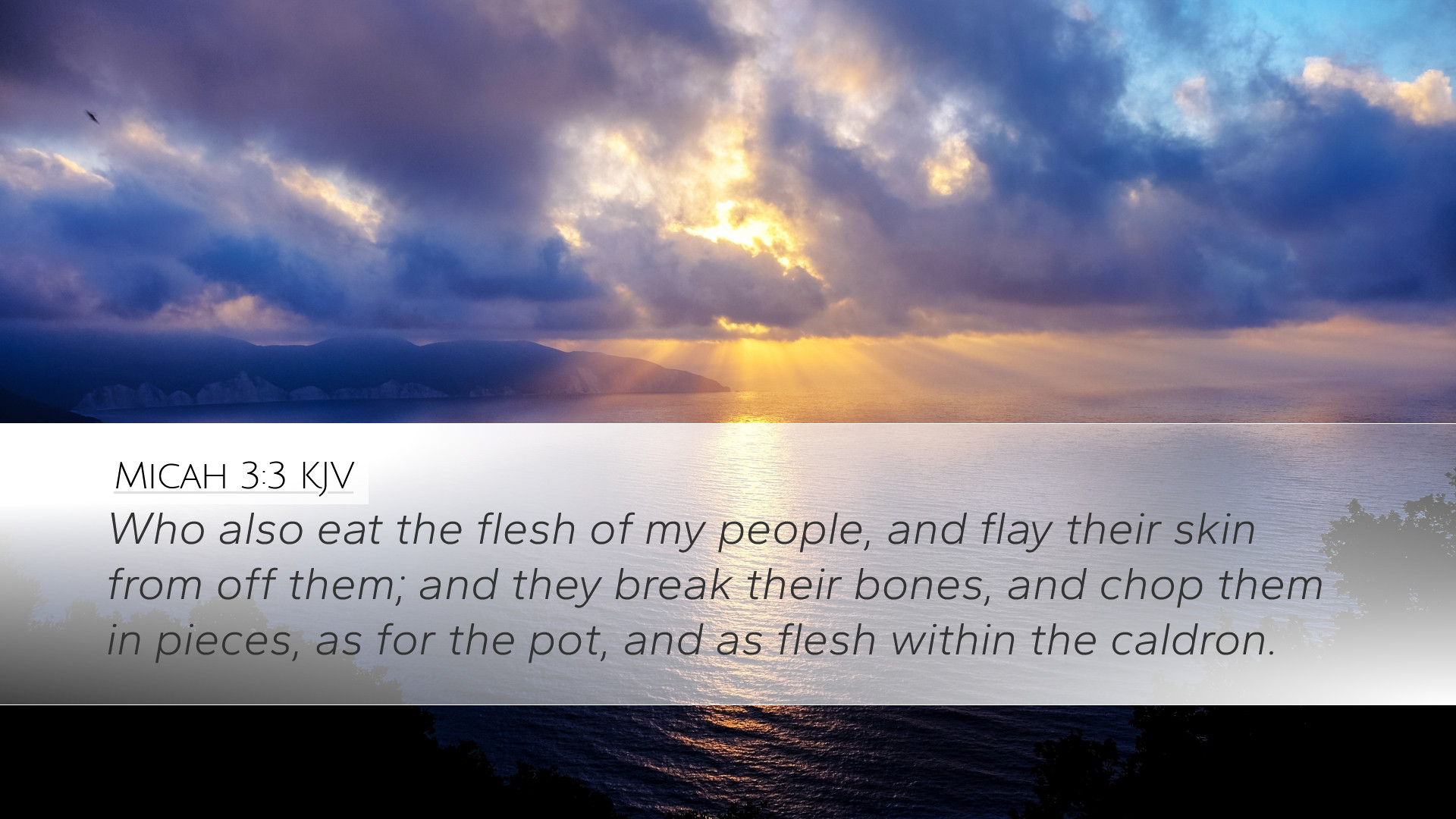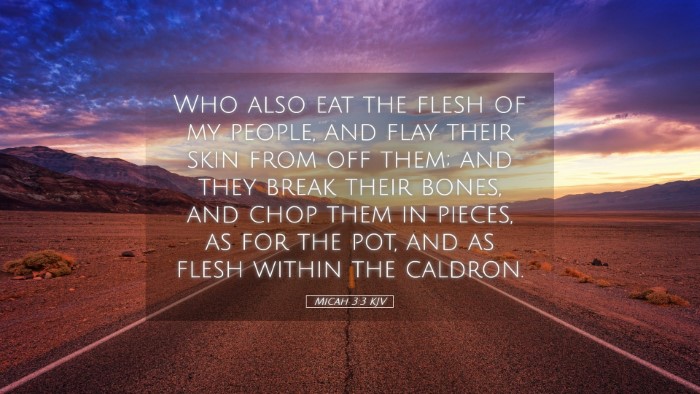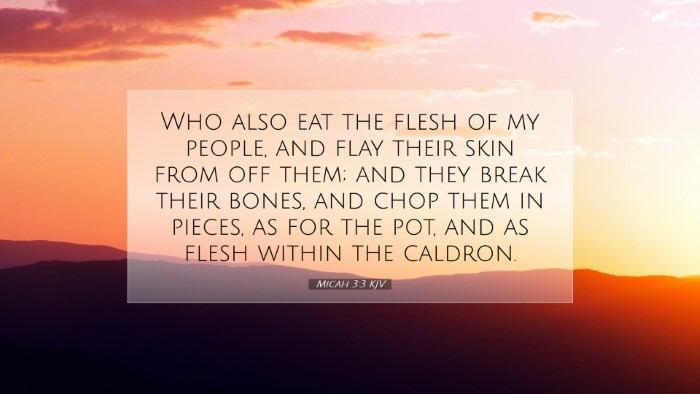Old Testament
Genesis Exodus Leviticus Numbers Deuteronomy Joshua Judges Ruth 1 Samuel 2 Samuel 1 Kings 2 Kings 1 Chronicles 2 Chronicles Ezra Nehemiah Esther Job Psalms Proverbs Ecclesiastes Song of Solomon Isaiah Jeremiah Lamentations Ezekiel Daniel Hosea Joel Amos Obadiah Jonah Micah Nahum Habakkuk Zephaniah Haggai Zechariah MalachiMicah 3:3
Micah 3:3 KJV
Who also eat the flesh of my people, and flay their skin from off them; and they break their bones, and chop them in pieces, as for the pot, and as flesh within the caldron.
Micah 3:3 Bible Commentary
Commentary on Micah 3:3
Verse: “Who also eat the flesh of my people, and flay their skin from off them; and they break their bones, and chop them in pieces as for the pot, and as flesh within the caldron.” - Micah 3:3
Introduction
This verse stands as a powerful indictment against the corrupt leaders of Israel, illustrating the severe failings of those in positions of authority who exploit and oppress the vulnerable. Here, Micah employs vivid imagery to depict the moral decay and cannibalistic instincts of these leaders, emphasizing their total disregard for justice and the well-being of God’s people.
Contextual Analysis
The book of Micah, one of the Minor Prophets, addresses both judgment and hope for Israel. Micah's prophetic ministry occurs during a time of social injustice, idolatry, and corruption among the leaders. In chapter 3, Micah particularly targets the rulers and prophets, condemning their betrayal of God’s covenant and their exploitation of the people.
Expository Insights
According to Matthew Henry, Micah's description of leaders as those who "eat the flesh" of the people signifies the way these officials prey upon the masses for their gain. He notes the metaphorical language represents destructive leadership that sacrifices the well-being of the populace for wealth and power. This imagery paints a graphic picture which highlights the seriousness of their sins.
Albert Barnes expounds further, explaining that leaders ‘flaying the skin’ refers to the harsh and inhumane treatment of the people. They employ extortion and unjust practices, stripping the powerless of their rights and dignity. Barnes emphasizes that this practice is indicative of a lack of true shepherding, where leaders are called to protect rather than devour.
Adam Clarke identifies the ‘caldron’ imagery to showcase how these leaders perpetuate a cycle of greed and exploitation. Just as flesh is boiled for consumption, so too are the poor trapped in a continuous cycle of oppression and desperation by their leaders. Clarke highlights that this verse presents the leaders' moral bankruptcy and the dire consequences of their actions.
Theological Implications
Micah 3:3 serves as a stark reminder of the ethical responsibilities of leaders, drawing a parallel to the weighty expectations placed upon those in positions of authority within the church and society. As noted by Henry, it prompts theological reflection on the nature of justice and righteousness and highlights God’s concern for the marginalized.
The implications of this verse extend beyond the historical context into practical theology. It calls church leaders today to ensure they are not exploitative; instead, they must act as true stewards of God's flock, embodying the virtues of care, compassion, and justice. This aligns with Jesus’ teachings in the New Testament regarding servanthood and the responsibility of leaders to protect and nurture rather than oppress.
Practical Applications
- Vigilance Against Corruption: Leaders must remain vigilant against corrupt practices in their ministries and organizations. This extends to financial accountability, ethical governance, and safeguarding the rights of all congregants.
- Advocacy for the Oppressed: Churches and individuals are called to stand against systems of injustice, advocating for those who are marginalized, just as God’s prophets did in the Old Testament.
- Cultivating a Model of Servant Leadership: Leaders should model their practices after Christ, who emphasized servanthood and sacrifice for the sake of others.
- Community Support and Care: It is essential for church communities to foster environments where every member feels valued and cared for, reflective of God’s love and justice.
Conclusion
In summary, Micah 3:3 is a poignant call to examine the ethical and moral responsibilities of those in leadership. Through this vivid imagery, Micah reveals the destructive consequences of abusive leadership while urging a return to fidelity to God’s character—a character that upholds justice, mercy, and humility. As the church reflects upon this verse, it is essential to internalize the lessons it offers, ensuring that our leadership mirrors the heart of God, caring for and protecting His people rather than exploiting them.


